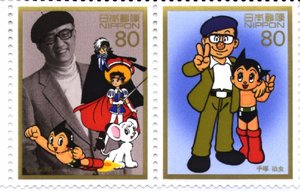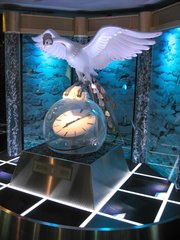Osamu Tezuka
|
|
Dr. Osamu Tezuka (手塚 治虫 Tezuka Osamu, November 3, 1928 - February 9, 1989) was a Japanese manga artist and animator born in Ōsaka. He is best known as the creator of Astro Boy.
His prolific output and his pioneering techniques and genres earned him such titles as "the father of manga" and "the god of manga." The distinctive "large eyes" style of Japanese animation was invented by Tezuka, who based it on cartoons of the time such as Betty Boop by Max Fleischer and Mickey Mouse by Walt Disney. As an indication of his productivity, the Complete Manga Works of Tezuka Osamu (手塚治虫漫画全集, published in Japan) comprises some 400 volumes, over 80,000 pages (in fact, his complete opera includes over 700 mangas in about 170,000 pages); even so, it is not quite comprehensive.
He was formally trained as a physician, but devoted his life to the production of an enormous body of manga work, the vast majority of which has never been translated from the original Japanese and is thus inaccessible to Western audiences. He began his career as a manga creator while a university student. His medical and scientific knowledge enriched his sci-fi manga, as well as Black Jack, a series about a genius rogue surgeon.
Famous creations include Astro Boy (Tetsuwan Atomu in Japan), Black Jack, Princess Knight, Phoenix (Hi no Tori in Japan), Kimba the White Lion (possibly an inspiration for Disney's The Lion King), and Adolf. His "life's work" was Phoenix—a story of life and death, concerning an eponymous phoenix whose blood endows those who drink it with immortality.
Tezuka headed the animation production studio Mushi Pro ('Bug Production'), which pioneered TV animation in Japan. The name of the studio derives from one of the kanji {"虫") used to write his name.
It is well-known that many of the yet-to-flourish young manga artists once lived in the apartment where Tezuka lived, Tokiwa-so. (As the suffix -so indicates, this was probably a small, inexpensive apartment.) The residents included Shotaro Ishinomori, Fujio Akatsuka, and Fujiko Fujio (both of the duo).
In 1994 the city of Takarazuka, where Tezuka grew up, opened a museum in his memory. In 1997 stamps were issued in his honor.
Manga & anime (partial list)
The years cited beside each title refer to the period of manga serialization.
- Diary of Ma-chan, 1946. Tezuka debuted with this four-panel newpaper strip, published in the Osaka edition of Shokokumin Shimbun (Mainichi School Children's Newspaper). He was only 17 years old when he produced this work.
- Shin Takarajima (New Treasure Island), 1947. This is the manga that made Tezuka a household name in Japan. It is an action-adventure drama inspired by Robert Louis Stevenson's book, about a boy named Pete whose discovers a map to Treasure Island and embarks on a voyage to find it. The Western-style art and fast-paced storyline attracted much attention, and it became a best seller with 400,000 copies sold, laying the groundwork for the manga craze.
- Jungle Taitei (Jungle Emperor Leo), 1950-54. Better known in the USA as Kimba the White Lion, this manga established one of Tezuka's most iconic creations. His first full-scale long serial, Jungle Taitei follows the adventures of Leo the lion as he seeks to succeed his father, killed by a hunter, as king of the jungle. In 1965, Mushi Productions came up with an anime series based on the manga. A full-length animated film (http://www.imdb.com/title/tt0119406/) was released in 1997.
- Metropolis, 1949. One of Tezuka's early science fiction works, about a private detective, Higeoyaji, who tries to take care of Mitchy, a female android, after her creator is killed. This work was heavily influenced by the Fritz Lang film Metropolis (1926). It would be made into a 2001 animated film.
- Captain ATOM, 1951-52. A science fiction manga about the coexistence and conflict between humans and aliens from another planet. Astro Boy made his debut in this manga as a supporting character. After Astro Boy became popular, Tezuka rewrote Captain ATOM as an episode of Astro Boy.
- Tetsuwan ATOM (Astro Boy), 1952-68. A sequel to Captain ATOM, it made Astro Boy its main character. Eventually, Astro Boy would become Tezuka's most famous creation. In 1963, Astro Boy made its debut as the first commercial animated program on Japanese television. The 30-minute weekly program received high public and critical acclaim, and led to the first craze for anime in Japan. Several other Astro Boy series have been made since. Columbia Pictures (Sony) has announced that a CGI-animation Astro Boy movie is currently in production.
Princess_Knight.png
- Ribbon no Kishi (Princess Knight), 1953-56. A gender-bending adventure drama about Princess Saphire, a girl who must pretend to be a boy. The manga was inspired by the themes and styles of musicals by the all-girl Takarazuka Revue, which Tezuka had watched in his youth. Ribbon no Kichi itself established many of the themes and styles of later shōjo (girls' manga), such as its affinity for androgynous heroes, and is sometimes referred to as "the Mother of all shōjo."
- Hi no Tori (Phoenix), 1956-89. Tezuka's most profound and ambitious work, dealing with man's quest for immortality, ranging from the distant past to the far future. It remains unfinished. Phoenix has been filmed several times, most notably as Phoenix 2772 (http://www.imdb.com/title/tt0079293/) (1980).
- Black Jack, 1973-83. The story of Black Jack, a talented surgeon who operates illegally, using radical and supernatural techniques to combat rare afflictions. This is the longest of Tezuka's works. Black Jack received the Japan Cartoonists' Association Special Award in 1975 and the Koudansha Manga Award in 1977. Three Black Jack TV movies were released between 2000-01.
- Buddha, 1974-84. Tezuka's unique interpretation of the life of Buddha.
- Tell Adolf (Adolf), 1983-85. A manga set in the pre-World War II era, it centers around three people with the name Adolf—one a Jew, one a Nazi, the third being Adolf Hitler himself.
See also
External links
- Official site (http://www.tezuka.co.jp) (in Japanese and English)
- Tezuka: God of Comics (an extensive overview) (http://www.hanabatake.com/research/tezuka.htm)
- Osamu Tezuka's filmography (http://www.imdb.com/name/nm0856804/) on the Internet Movie Database (http://www.imdb.com/)de:Osamu Tezuka
es:Osamu Tezuka eo:TEZUKA Osamu fr:Osamu Tezuka ko:데즈카 오사무 id:Osamu Tezuka it:Osamu Tezuka nl:Osamu Tezuka ja:手塚治虫 no:Osamu Tezuka pt:Osamu Tezuka ru:Тэдзука, Осаму fi:Osamu Tezuka sv:Osamu Tezuka zh:手塚治虫


